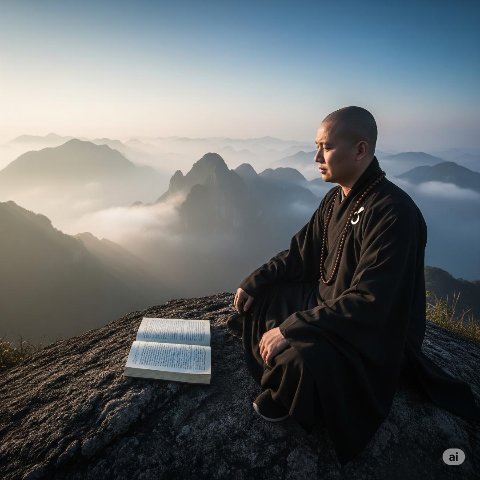The Sage in the Green Mountains
Lessons from a Barefoot Doctor and a Seeker’s Journey
By: Cheng Tong - Jun 06, 2025
In our studies of healing, spirituality, and the subtle energies that animate life, we often encounter wisdom through ancient texts or the transmitted teachings of our lineage. But what happens when a story read on a remote mountaintop leaps from the page, inspiring a quest that bridges continents and culminates in a face-to-face encounter with its living embodiment? This essay is about such a journey, sparked by Quang Van Nguyen’s profound memoir, “Fourth Uncle in the Mountain,” and the lessons gleaned from finding and meeting this remarkable healer.
I first encountered “Fourth Uncle on the Mountain” during a deeply formative period of my life – while living as a Daoist monk at a small temple nestled on a mountaintop in
Immersed in the rhythms of monastic life, the principles of the Tao, and the cultivation of qi, the story of Quang Van Nguyen and his adoptive father, Thau, resonated profoundly. Here was a narrative not of abstract philosophy, but of lived experience: a “barefoot doctor” navigating the ravages of war in
The book is more than a memoir; it is an odyssey into a world where the spiritual and physical are inextricably linked, where healing encompasses not just the body but the mind and spirit, and where the master-student relationship is a sacred trust. It speaks of a time and place where “magic” was simply a deeper understanding of nature’s laws, and where one’s character and spiritual cultivation were as essential to healing as knowledge of herbs or techniques. As I read, surrounded by the mists and mountains that have inspired sages for millennia, Quang’s story felt less like history and more like a living transmission.
Years later, after returning to the
In email exchanges with Cheng Feng, we wondered if we could find him after all the years since his escape from
The afternoon spent with Quang Van Nguyen was a lesson in presence. Here was a man who had lived through unimaginable hardship, who carried an ancient lineage of healing, and who was, by any measure, a true master. I recall being particularly struck by his calm yet firm presence. There was an undeniable power in his stillness, a palpable sense of his qi – strong, clear, and rooted. As someone who has dedicated years to the cultivation and perception of this vital energy, I could sense the depth of his internal work, and I am certain he could sense mine. This silent, energetic exchange often speaks more profoundly than words.
He is a devout Buddhist, and it was clear that his spiritual beliefs are not an adjunct to his life but its very foundation. Everything about him, from his gentle demeanor to the simple, authentic way he and his wife lived in their small house in the woods, spoke of a man wholly integrated in his principles. He was, in the truest sense, genuine. He didn’t just practice medicine; he lived a life of healing, compassion, and mindfulness. He was, as I had learned from his book, a true pulse master, his diagnostic skills honed through decades of dedicated practice, yet his wisdom extended far beyond the physical.
So, what are the teachings for us, as students of the way, of healing, of inner cultivation?
First, the story of Quang Van Nguyen and “Fourth Uncle in the Mountain” reminds us that wisdom is alive. It is not confined to ancient scrolls or distant histories. It walks among us, often in humble guise. The lineages of healing and spiritual insight are passed through living, breathing human beings who embody the teachings.
Second, the journey of the seeker is essential. The willingness to follow an inner calling, to step out of our comfort zones in pursuit of knowledge or connection, is itself a transformative practice. My search for Quang was driven by a deep resonance with his story, and the effort made the eventual meeting all the more meaningful.
Third, true mastery is often characterized by profound humility and authenticity. Quang’s calm presence, his powerful yet gentle qi, and his simple lifestyle are a testament to this. There was no pretense, only a deep, abiding sense of purpose and peace. This reminds us that the goal of our practices is not aggrandizement, but a deeper integration of wisdom into the fabric of our being.
Fourth, the cultivation of qi and presence is not an esoteric fancy but a tangible reality. The ability to sense, and be sensed, on this energetic level is a fundamental aspect of many traditional healing and spiritual arts. Quang’s palpable energy was a living demonstration of what dedicated practice can cultivate.
Finally, Quang Van Nguyen’s life, as depicted in his memoir and as I witnessed in person, underscores the power of resilience and the importance of living one’s beliefs fully. Despite war and displacement, he carried forward his healing mission, integrating it seamlessly with his Buddhist faith.
I encourage you to read “Fourth Uncle in the Mountain.” Allow its story to touch you. But more than that, I encourage you to look for the “Fourth Uncles” in your own lives – the individuals who embody the wisdom you seek. Be open to the journeys they inspire, and cultivate the presence to truly receive the lessons they offer, often in the simplest of ways. For the deepest teachings are not just learned; they are experienced.

